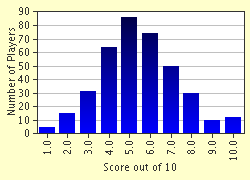Quiz Answer Key and Fun Facts
1. Most meteorites come from?
2. What is the object called after it hits the ground (Providing it survives!)?
3. What is the object called before it enters our atmosphere?
4. What is the object called when we see the streak of light in the sky?
5. What are the three major types of meteorites?
6. Who is considered to be the Father of American Meteoritics?
7. How wide is Meteor Crater, AZ at the rim?
8. How deep was Meteor Crater right after the impact?
9. Meteor Crater was at one time thought to have been formed by a?
10. Most asteroids formed when?
Source: Author
almach
This quiz was reviewed by FunTrivia editor
gtho4 before going online.
Any errors found in FunTrivia content are routinely corrected through our feedback system.


